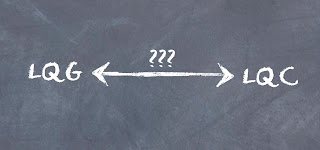Recently, I have been thinking about the question what it actually means to derive loop quantum cosmology from loop quantum gravity. In other words, what is the benchmark by which we can claim success in this task? Given that several interesting proposals for such a derivation have appeared recently, it is time to ask this meta-question.
First, one should probably ask two different questions as a warm up:
1) What is the cosmological sector of LQG?
2) What is LQC?
The answer to the first question is so far unclear, at least to me. It is directly connected to the question of how to write down a quantum state that represents a homogeneous and isotropic universe. Should this be some linear combination of spin networks which, on a coarse scale, look homogeneous and isotropic? Or can this be a quantum state which is defined on a very coarse graph, maybe containing only a single vertex? If we allow us to use such a coarse state, then which dynamics should we use? Can we take our standard Hamiltonians, or should we compute some effective dynamics that are induced by some finer state? If we would use a fine state, we would then better have to show that the effective dynamics does not depend on the details of the state that are washed out by the coarse graining. To conclude, the answer to the first question depends on what we precisely mean by the continuum limit of LQG.
The second question on the other hand has more than one answer. One of them would be that LQC is a mini-superspace quantisation of general relativity using some input from loop quantum gravity. This input is on the one hand the choice of variables and Hilbert space. On the other hand, it is a choice of dynamics, which has been derived using coarse graining arguments. Another answer to question number 2 is that that LQC is a 1-vertex truncation of full LQG in the diagonal gauge, which also underlies LQC. Here, coarse graining arguments were not employed in the definition of the dynamics. Instead, the dynamics that one obtains from quantisation were directly applied the 1-vertex quantum state, hinting that they are somehow already coarse grained. A similar strategy was also employed in spin foam cosmology.
So what did we learn now? We know that LQC is at the same time a mini-superspace quantisation using LQG techniques and a 1-vertex truncation of LQG. Of course, LQC might be more: it could secretly be also a coarse grained LQG based on very fine states, but this remains to be shown. If this would be the case, then we would have strong support to claim that LQC is indeed the cosmological sector of LQG.
So how far are we along deriving LQC from finer states? The following main lines of work come to my mind: “quantum reduced loop gravity” implements the diagonal gauge fixing at the quantum level, together with a reduction of the degrees of freedom. The derivation of the dynamics in this approach is so far at the level of expectation values, which means that the time evolution agrees with LQC possibly only for small times. Another approach are condensate states used on the context of group field theory, i.e. condensates of building blocks of geometry. Here, one is able to extract an effective cosmological dynamics from the GFT equations of motion and studies perturbations thereon. It is currently not clear to me however to which extend such a condensate state qualifies as a very fine and homogeneous state. In both approaches, one obtains LQC only up to corrections, whereas in the 1-vertex truncation, one obtains it exactly. Without the use of any gauge conditions or simplifications, the situation is less clear. Interesting recent work along these lines can be found for example here, here, and here, mainly with the conclusion that in this case, LQC cannot exactly follow from LQG.
To conclude, it is not really clear what it means to derive LQC from LQG before one agrees upon what LQC actually is. Depending on your choice, you might be satisfied with existing derivations or not. The tricky questions is clearly the one about the cosmological sector of LQG, since it involves the whole story about coarse graining the dynamics.

No comments:
Post a Comment